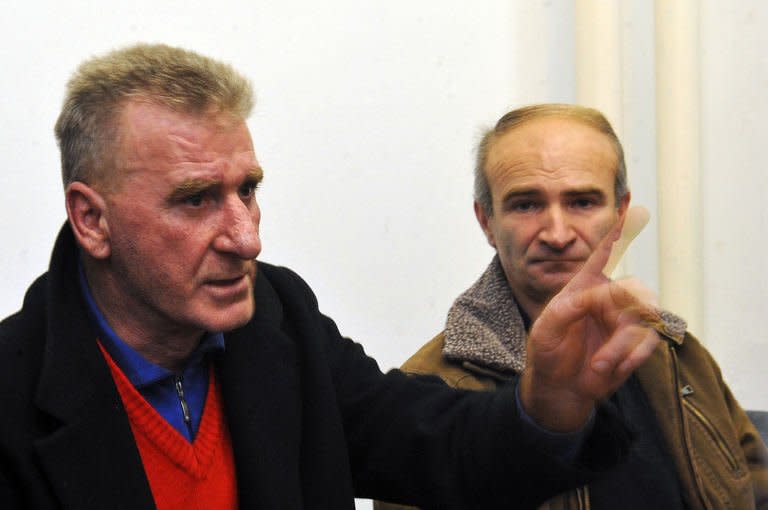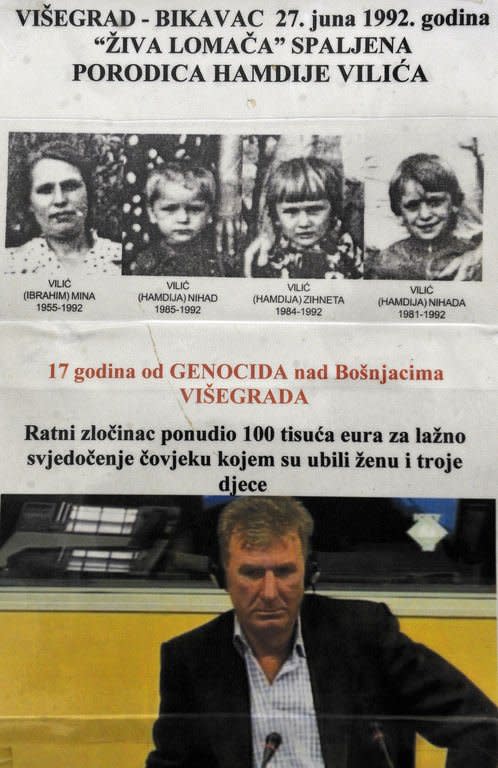Bosnian Serb defiant as UN court upholds convictions
The UN's Yugoslav war crimes court on Tuesday upheld Bosnian Serb paramilitary leader Milan Lukic's life sentence for murdering Muslims during Bosnia's bloody 1992-95 war and ordered his cousin and co-accused to remain in jail although with a lesser sentence. A defiant Lukic smiled at victims and their relatives in the public gallery and made the sign of the cross shortly after hearing his appeal had been turned down by the International Criminal Tribunal for the former Yugoslavia's (ICTY) appeals chamber. The two cousins were appealing their 2009 convictions at the ICTY for killing Muslims in ways the court had described as "the worst acts of inhumanity" and "callous and vicious". "Are you Chetnik?" one of the women representing victims in the public gallery shouted at him after the verdict, referring to the name Serbian ultra-nationalist paramilitaries gave themselves during Bosnia's bloody 1992-95 war. "I hope your children turn in their graves," shouted the woman who refused to give her name. Milan Lukic smiled at her before shaking his lawyer's hand and being taken away by guards. The appeals chamber "affirms Milan Lukic's sentence of life imprisonment (and) reduces Sredoje Lukic's sentence of 30 years imprisonment to a sentence of 27 years," judge Mehmet Guney told the Hague-based court. Both men had asked the court to reverse their convictions, and the prosecution had also filed an appeal seeking an increase in Sredoje Lukic's sentence. The verdicts are likely to anger Belgrade further, coming in the wake of acquittals on appeal of General Ante Gotovina, Croatia's highest-ranking army officer before the court and the acquittal of former Kosovo prime minister Ramush Haradinaj last month. The acquittals were hailed in Croatia and Kosovo, but met with bitterness by Serbs, many of whom view the tribunal as biased against them. A panel of judges in July 2009 found Milan Lukic, 45, guilty of killing at least 132 Muslims. Among other crimes, ICTY judges said he helped burn alive at least 119 people who were locked up by paramilitary fighters in two different houses that were set on fire on different days in June 1992 around the town of Visegrad in eastern Bosnia. The appeals chamber found that in one of those attacks, known as the Pionirska Street fire, 53 rather than 59 people had died. The court also reversed Sredoje's conviction for beating detainees at the Uzamnica barracks that was being used as a detention centre, thus reducing his sentence by three years. Milan Lukic dressed in a black suit, white shirt and black tie, sat emotionless until the judgement was read, chewing on a piece of gum and occasionally reading from what appeared to be a prayer book. Sredoje Lukic, dressed in a black suit, light blue shirt and dark blue tie, peered nervously over his glasses and looked at the judge as he read the verdict. "For me and all my folks from Visegrad, for all the victims, our families, this is a rebirth", Bakira Hasecic, who says she was raped in Visegrad, told journalists outside the court, raising her arms in the air as a sign of victory and a large smile across her face. "Finally, the Hague tribunal has shown why it has been set up". In Sarajevo, Esad Tufekcic, 51, whose wife and two children, aged one and four were burned alive, told AFP he was happy that Milan Lukic's sentence was upheld, but "I'm not glad Sredoje's sentence was reduced." But he said no sentence, no matter how severe could serve justice for victims who died in the fire. "They killed women and children who died in horrible pain, (who were) burned alive.... No sentence could really serve the justice," Tufekcic told AFP. Judges in the initial trial had said the two burnings "exemplify the worst acts of inhumanity that a person may inflict upon others". Milan Lukic was a founding member of a group known as the White Eagles or Avengers that worked with police and military units between 1992 and 1994 to terrorise Muslim communities. His cousin joined later. Milan Lukic was transferred to The Hague in February 2006 from Argentina, where he was arrested in August 2005 after being on the run for more than five years. Sredoje Lukic, who was hiding in Russia according to prosecutors, turned himself in to Bosnian Serb authorities in September 2005, and was then transferred to The Hague. Both had been on a list of 10 most-wanted Serbs.



